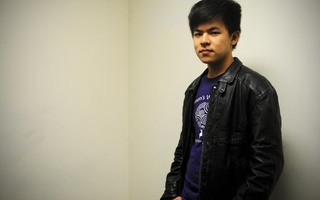“The practice of asking someone their PGP destabilizes the idea that gender just is—that it should be something that is in accordance with your biology, your genitalia, or whatever else society thinks it should be in accordance with,” said Jake, a transgender senior whose name was changed by The Crimson because he said he wants to live as a man in the future without people knowing his gender history. “It’s respectful, and it makes gender-variant members of the community more comfortable.”
The idea of expressing a non-binary gender is not new. In some Native American communities, “Two-Spirit” individuals were revered, and in other societies around the world, individuals with non-binary genders are an important part of the social fabric. But in 21st-century America, asking for preferred pronouns in public spaces is unusual.
Though many are unsure whether or how to ask people about their PGP, Jonas Q. Wang ’12 says the best option is to simply ask.
“It’s just like, ‘What’s your name?’ Follow it up with, ‘What’s your PGP?’” said Wang, a former co-chair of Harvard College Queer Students and Allies who is transgender. “There’s no one approach everyone follows, and it won’t be awkward if you don’t make it awkward. As long as you’re respectful and kind, the rest should follow.”
Even when students are introduced to a person’s preferred pronouns, making the switch for someone they have known by a different pronoun can be a difficult adjustment.
Brianna J. Suslovic ’16 said she had to consciously make an effort to use the correct pronouns when a friend recently transitioned to male pronouns.
“It was a lot of slipping up and correcting myself when referring to him in the beginning,” she said.
But Alex said that they value even a friend who refers to them with an outdated pronoun if that friend acknowledges the mistake.
“Whenever someone says ‘I’m really sorry if I slip up, but I’m trying,’ I almost feel like I’m going to cry,” Alex said. “It’s so rare to hear [someone acknowledging their mistakes] here.”
HOUSE, YEAR, PGP
“When I first arrived on campus, trans issues weren’t really on the radar unless you were in the BGLTQ community,” Wang said. “And even in the BGLTQ community, it wasn’t really on the radar unless you were interested in trans issues.”
Wang said that while he and his friends used their preferred pronouns among themselves, there were few others who did that. The Women’s Cabinet, a group of organizational leaders hosted by the Women’s Center, was one of the only groups that actively incorporated PGPs into meetings.
Now, due at least in part to the arrival of a new director of BGLTQ student life who has personally dealt with issues of public pronoun usage, more and more Harvard students are acknowledging PGPs in daily conversations and meetings.
“This year, the QSA decided to reinstitute PGPs into our regular meetings as part of our overall mission to be more open to everyone,” said QSA co-chair Roland Yang ’14. “I personally think that it’s just as important as saying your House and your concentration.”
Alex said that at this year’s pre-orientation First-Year Urban Program, PGPs were a part of introductions and program leaders explained their importance.
Read more in News
Student Dissertation Sticks to Schedule Despite Hurricane SandyRecommended Articles
-
 Tolerance at Harvard: Students Lag Behind Administration
Tolerance at Harvard: Students Lag Behind Administration -
Name, Year, House, PGP?Despite generally best intentions, Harvard is still not as trans-friendly a school as we could be.
-
The Harvard Crimson Style Guide: 2015 SupplementWe at The Harvard Crimson acknowledge the evolving nature of language, and as such we recognise the necessity of updating our comprehensive Style Guide to accommodate questions that have arisen over the past few years.
-
 UC Launches 'Side by Side' Gender Equality Campaign
UC Launches 'Side by Side' Gender Equality Campaign -
Students Indicate Preferred Gender Pronouns at RegistrationThe Faculty of Arts and Sciences’ registration tool now gives students the option to choose preferred gender pronouns.













